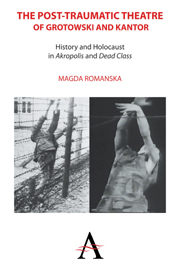 The Post-traumatic Theatre of Grotowski and Kantor
The Post-traumatic Theatre of Grotowski and Kantor Book contents
- Frontmatter
- Contents
- Foreword by Kathleen Cioffi
- Preface
- Acknowledgments
- List of Illustrations
- Introduction
- Part I Our Auschwitz: Grotowski's Akropolis
- Chapter 1 Jerzy Grotowski: A Very Short Introduction
- Chapter 2 Native Son: Grotowski in Poland
- Chapter 3 Grotowski: The Polish Context
- Chapter 4 Grotowski, the Messiah: Coming to America
- Chapter 5 The Making of an Aura
- Chapter 6 On Not Knowing Polish
- Chapter 7 “In Poland: That is to Say, Nowhere”
- Chapter 8 Akropolis/Necropolis
- Chapter 9 The Vision and the Symbol
- Chapter 10 “This Drama as Drama Cannot Be Staged”
- Chapter 11 Two National Sacrums
- Chapter 12 “Hollow Sneering Laughter”: Mourning the Columbuses
- Chapter 13 Against Heroics
- Chapter 14 Representing the Unrepresentable
- Chapter 15 Trip to the Museum
- Chapter 16 Bearing the Unbearable
- Chapter 17 The Living and the Dead
- Chapter 18 Jacob's Burden
- Chapter 19 The Final Descent
- Chapter 20 Textual Transpositions
- Chapter 21 Akropolis After Grotowski
- Part II Our Memory: Kantor's Dead Class
- Postscript
- Appendix
- Notes
- Bibliography
- Index
Chapter 15 - Trip to the Museum
from Part I - Our Auschwitz: Grotowski's Akropolis
- Frontmatter
- Contents
- Foreword by Kathleen Cioffi
- Preface
- Acknowledgments
- List of Illustrations
- Introduction
- Part I Our Auschwitz: Grotowski's Akropolis
- Chapter 1 Jerzy Grotowski: A Very Short Introduction
- Chapter 2 Native Son: Grotowski in Poland
- Chapter 3 Grotowski: The Polish Context
- Chapter 4 Grotowski, the Messiah: Coming to America
- Chapter 5 The Making of an Aura
- Chapter 6 On Not Knowing Polish
- Chapter 7 “In Poland: That is to Say, Nowhere”
- Chapter 8 Akropolis/Necropolis
- Chapter 9 The Vision and the Symbol
- Chapter 10 “This Drama as Drama Cannot Be Staged”
- Chapter 11 Two National Sacrums
- Chapter 12 “Hollow Sneering Laughter”: Mourning the Columbuses
- Chapter 13 Against Heroics
- Chapter 14 Representing the Unrepresentable
- Chapter 15 Trip to the Museum
- Chapter 16 Bearing the Unbearable
- Chapter 17 The Living and the Dead
- Chapter 18 Jacob's Burden
- Chapter 19 The Final Descent
- Chapter 20 Textual Transpositions
- Chapter 21 Akropolis After Grotowski
- Part II Our Memory: Kantor's Dead Class
- Postscript
- Appendix
- Notes
- Bibliography
- Index
Summary
During the first twenty years following World War II, in Poland, Auschwitz was a site of political and ideological manipulations, where numerous political interests intertwined, structuring and restructuring its meaning. In the early years, Auschwitz served as a symbol of national struggle, but also as a tool of Cold War propaganda, a site of antifascist/anticapitalist manifestations. It is here, for example, that the Polish government staged a demonstration against the Korean War to denounce the “imperialistic” policies of the USA. And in the 1950s, at one of the exhibits, pictures of Auschwitz prisoners were placed alongside photos of New York's homeless and caricatures of American soldiers. In 1955, following Stalin's death, nationalist sentiments resurfaced: a new exhibit was opened that again stressed the national, rather than the ethnic, identities of the Auschwitz victims. As a result of all the political propaganda, in the early 1960s Auschwitz became a principal destination of school groups and workplace trips, visited more often than Wawel. In homage to Borowski, in 1959 Tadeusz Rożewicz even wrote a short story, “Trip to the Museum” [Wycieczka do muzeum], attempting to capture the sheer horror and superficiality of those trips. Using Borowski's deadpan tone, Rożewicz coolly describes the stream of tourists wandering the Auschwitz site. In search of excitement, carelessly quoting sentimental cliches and propaganda slogans, they eagerly ask where they can see “the hair.”
- Type
- Chapter
- Information
- The Post-traumatic Theatre of Grotowski and KantorHistory and Holocaust in 'Akropolis' and 'Dead Class', pp. 126 - 128Publisher: Anthem PressPrint publication year: 2012


